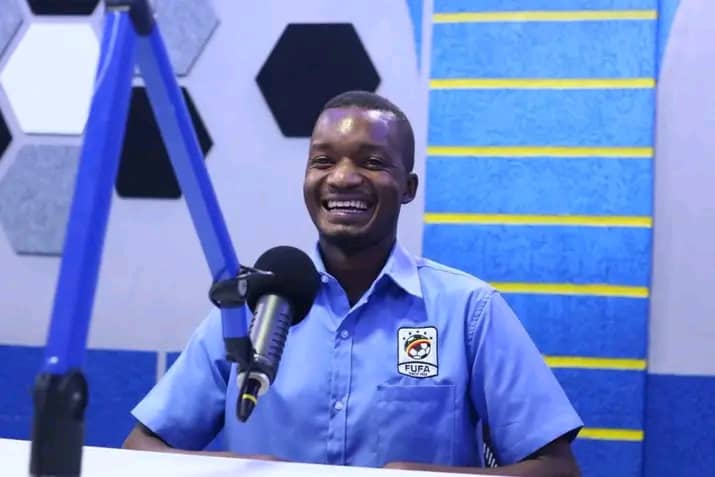By Eriah Lule
“You cannot be doing sports and say you are working; that is playing,” President Yoweri Museveni remarked during his speech that ended in 2022 in regards to sports in Uganda.
Daniel Karibwije, a sports journalist with New Vision, says such statements not only break athletes’ hearts but further cripple the sports industry, which is already struggling.
Novah Kibuuka, a football commentator for the Federation of Uganda Football Association’s (FUFA) television and radio, was not pleased with the president’s statement. “It disregards the effort we put in on a daily basis to have a revenue-collecting industry,” he said.
However, this does not stop Kibuuka from going ahead with his career. The 25-year-old believes that commentating is the career for him, a dream come true.

Kibuuka debuted at the Sports Competition on Radio Buddu in Masaka City in 2015. At the time, he was a student at Kako Secondary School. Even though he didn’t perform well that year, he still competed again in 2016, where he managed to reach the semi-finals. It was here that he got a chance to meet Moses Bogere, a commentator for Akabozi Radio, Kampala, whose work he had admired for a long time.
Fufa journey
He joined the organization as an intern in 2020, and his stay was meant for 2 months. But because of his competence, he was retained as a 3 p.m. news reporter from Mukono. A few months later, he was given a show called “Sports Clinic,” which used to run from 8 a.m. to 10 a.m. every Saturday.
When the COVID-19 pandemic hit, Kibuuka was laid off from working on his show. He went back to Masaka, where he continued with radio reporting. After his last semester at Uganda Christian University (UCU) in 2020, he was asked to start practicing news anchoring, which he did well for a period of time.
In 2021, the FUFA station administrator, Meddy Sengendo, asked Kibuuka to start practicing commentary. “That was my turning point.” “I felt my dream come to life,” Kibuuka said. “I spent about six months making demos.”
After listening to Kibuuka’s demos, John Kiiza, the program director of FUFA radio, asked him to join the commentating team. “With his talent, we wouldn’t risk him in the news department.” “He came on board with new ideas, and we believe that with time, he will be one of the most recognized commentators in the country,” he said.
Kibuuka began with women’s football and progressed to the Africa Cup of Nations (AFCON) 2021 in Cameroon, the World Cup 2022 in Qatar, Uganda Premier League matches, and all subsequent football leagues in Uganda for both men and women.
He now has a football fans program on FUFA TV called Vuvuzela, as well as a competition desk on FUFA radio.
When asked how he felt about his first salary, Kibuuka said he would never forget that day. After the game between the Lady Cardinals (UCU’s women’s football team) and Olila High School, he was paid Shs. 100,000. “This was the first time I was being paid, and out of excitement, I treated myself to a heavy lunch,” he said.
Kibuuka lauds UCU for its programs that sharpened and directed his ethics and integrity as a Christian in his profession.
With his photos circulating on Ugandan Football’s social media handles, Kibuuka has undoubtedly set a standard for himself in the industry.
Ivor Kimbugwe, a UCU alumnus and the Chief Executive Officer of the Uganda Martyrs Women Football Team, credited Kibuuka’s talented voice and the power to capture people’s attention, which gives football a very interesting bit for listeners.
“With radio, it’s all about listening as you paint a picture in your mind, which Kibuuka is talented at,” he said. “With his voice on the radio, many will pay attention to whatever he is saying.”
The third child of Kizito Ssemukokooma and the late Florence Nassolo, he has begun to write his name on the walls of Ugandan football. Although his family has always been supportive, they saw commenting as a hobby rather than a career.
“My father bought me newspapers on a daily basis so that I could prepare for the competitions when I was in school,” he said. “When I told him I wanted to be a sports journalist, he was willing to pay, but where I would get the job was his worry.”
According to the Front Office Sports Blog, the English Premier League contributed $10.4 billion and supported 94,000 jobs in 2022.


